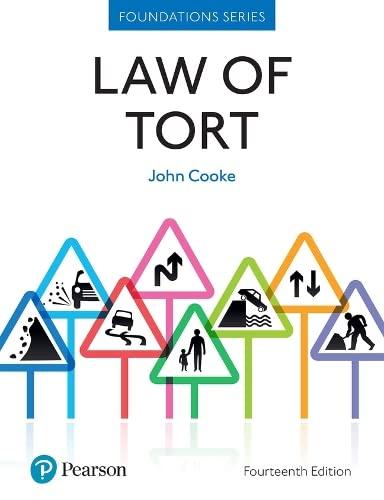Question
16. What do we mean by the term concurrent jurisdiction? A.Some kinds of cases must be heard by a state court first and then must
16. What do we mean by the term "concurrent" jurisdiction?
A.Some kinds of cases must be heard by a state court first and then must go to federal court.B.Some kinds of cases can be heard in either the state court or the federal court. C.Criminal cases which involve both state and federal crimes must be heard in state and federal courts concurrently, i.e. at the same time. D.Federal courts must hear all cases where parties live in two separate states concurrently.
3
17. The feature that distinguishes a common-law legal system from a civil law system is:
A.Requiring guilt to be proven beyond a reasonable doubtB.Using lay juries to decide casesC.Having an appeal processD.Stare decisis, or following precedent in reaching decisions
18. Alexander is a trial court judge in St. Louis County.He sees a case on his docket in which the defendant is listed as Talleyrand, Inc.Alexander's wife is an executive at Talleyrand, Inc.In this situation, Alexander should:
A. Ask his wife for any inside details of the case so that he can better determine which party is telling the truth at the trial. B. Recuse (remove) himself as the judge in the case, because he has connections with a party that might compromise his neutral role as the judge. C. Assure both parties at the beginning of the trial that he will be impartial and unbiased despite his wife's connection with Talleyrand, Inc. D. Say nothing and hope no one discovers his connection to one of the parties.
19. Laura has just been notified that Sam is suing her. The document that informs Laura of the allegations against her is called a(n):
A. Answer.B. Summons.C. Complaint.D. Service of process.
20. When an administrative rule has been properly promulgated under the Administrative Procedures Act, what effect does it have?
A. It has the same force and effect as a statute passed by the legislature. B. It has an effect only on the particular parties involved but not on the public at large. C. It takes effect within the agency but not outside of the agency. D. It has no effect, since administrative agencies usually are not given rule-making authority
Step by Step Solution
There are 3 Steps involved in it
Step: 1

Get Instant Access to Expert-Tailored Solutions
See step-by-step solutions with expert insights and AI powered tools for academic success
Step: 2

Step: 3

Ace Your Homework with AI
Get the answers you need in no time with our AI-driven, step-by-step assistance
Get Started


